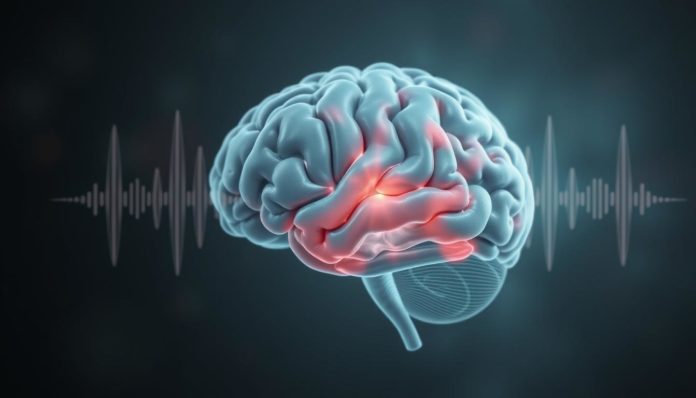Did you know about one-third of people with Alzheimer’s face voice problems as the disease progresses? This lesser-known issue is important but often overlooked. It affects daily life deeply. Alzheimer’s doesn’t only mean memory loss. It also leads to voice issues that make communication hard.
This article will shed light on how Alzheimer’s and voice changes are connected. This info helps caregivers and medical experts. We’ll examine how thinking problems affect speech. And we’ll look at how Alzheimer’s changes the way people speak and communicate.
Overview of Alzheimer’s Disease
Alzheimer’s disease targets older people, causing their minds to slowly fade away. It leads to loss of memory, confusion, and changes in how they act. This Alzheimer’s disease overview explains what it is, why it happens, how it progresses, and how common it is. It also talks about how doctors diagnose it and what happens in the brain.

What is Alzheimer’s Disease?
Alzheimer’s is a disease that destroys brain cells over time. It starts with forgetting little things and gets worse, affecting the mind and body. Things like our genes, environment, and getting older can make it more likely to happen. Knowing about Alzheimer’s disease and voice issues is key. Voice problems can be an early sign of this disease.
Symptoms of Alzheimer’s
The symptoms of Alzheimer’s vary greatly. Common ones are:
- Forgetting new information.
- Problems with solving problems or making plans.
- Being mixed up about time or place.
- Trouble understanding what we see, in terms of both images and how objects relate to each other in space.
- New challenges with speaking or writing, including voice issues.
- Not wanting to join in work or social events.
- Feeling or acting differently, including being more anxious or angry.
Spotting the symptoms of Alzheimer’s early, like voice changes, helps with getting the right help quickly. This can make life better for those with the disease.
Understanding Voice Problems in Alzheimer’s
Alzheimer’s disease leads to big changes in the brain, impacting many parts of life. One issue, often overlooked, is problems with the voice. We’ll look at how Alzheimer’s changes the brain and why this leads to voice issues.

How Alzheimer’s Affects the Brain
The spread of Alzheimer’s causes neurons to deteriorate, reducing brain mass. The hippocampus and frontal cortex suffer most. These areas are key for memory, feeling, and speaking.
When these neurons get damaged, it doesn’t just cause memory issues. It also disrupts the brain’s speech pathways. This affects how we produce and articulate words.
Link Between Cognitive Decline and Voice Issues
As the brain declines, we see a clear effect on how we communicate. Problems include forming sentences, slurring words, and vocal changes.
These speech issues can show up early in Alzheimer’s and get worse over time. They make it hard for people to talk to others, affecting social lives and happiness.
Here’s a closer look at how Alzheimer’s impacts the voice at different stages:
| Stage of Alzheimer’s | Observed Voice Issues |
|---|---|
| Early Stage | Minor word-finding difficulties, slight changes in voice pitch |
| Middle Stage | Frequent pauses, trouble articulating thoughts, noticeable slurring |
| Late Stage | Severe speech incoherence, inability to form sentences, monotone voice |
Voice Changes in Alzheimer’s
The way Alzheimer’s affects speech is getting a lot of attention lately. This is because changes in how someone talks can be early signs of the disease. As Alzheimer’s gets worse, people may notice big changes in their voice, like in how loud they talk or how clear their words are. Below, we look at these voice changes and why spotting them early is important for treatment.
Common Vocal Changes
Talking about Alzheimer’s vocal symptoms, some common issues come up. These include:
- Altered Pitch: An inconsistent or really high or low pitch can be one of the early voice changes in Alzheimer’s.
- Variations in Volume: Patients might talk much quieter or louder and have trouble controlling how loud they are.
- Rhythm Disruptions: Speech might get choppy, with unwanted pauses or speed-ups.
- Hoarseness: A raspy or weak voice might suggest early Alzheimer’s vocal symptoms.
Identifying Early Signs
Spotting early signs of vocal changes is key for early help. Some main signs are:
- Frequent Repetition: Repeating words or sentences often can show early voice problems linked to brain health.
- Difficulty Expressing Thoughts: Having trouble speaking or finishing thoughts can be early warning signs.
- Monotone Speech: Not changing tone when talking could point to a problem.
- Pronunciation Challenges: Saying words wrong or slurring could be early signs needing attention.
Spotting these early signs of vocal changes lets doctors diagnose and help Alzheimer’s patients faster. It’s key for families and those taking care of patients to watch for these changes. If they notice anything, they should talk to a doctor right away.
Speech Difficulties in Alzheimer’s
Alzheimer’s disease affects how well a person can speak and communicate. People with Alzheimer’s can have different speech difficulties. These problems can be hard both for the person with Alzheimer’s and their caregivers. It’s vital to understand these Alzheimer’s communication problems to help improve life for those impacted.
Types of Speech Difficulties
Patients with Alzheimer’s may face various types of speech impairment:
- Apraxia: This is when the brain can’t properly tell the speech muscles what to do. As a result, forming words becomes hard.
- Aphasia: People may struggle to find the right words or to understand others. This can greatly affect talking and understanding.
- Agnosia: This makes it hard for someone to recognize familiar objects or sounds, complicating communication even more.
Impact on Daily Communication
Speech problems in Alzheimer’s affect more than just chatting. They change how patients interact socially and manage daily activities. Alzheimer’s communication problems can make someone feel isolated or upset. Addressing these types of speech impairment in Alzheimer’s is crucial. It helps improve well-being and social interaction.
Addressing speech difficulties in Alzheimer’s is key to better daily life and social experiences for those affected.
Communication Challenges in Alzheimer’s
Communication challenges in Alzheimer’s can be tough on everyone involved. It’s hard to start or keep a conversation going. This problem affects speech and how people interact.
“Communication is one of the first and most heartbreaking casualties of Alzheimer’s disease. It can change how someone perceives themselves and how they connect with others.” — Maria Shriver
People with Alzheimer’s might not get complex sentences or find the right words. This can be frustrating. They might not stick to the topic, leading to choppy talks. These issues often make them less social and more isolated.
Caretakers need ways to overcome these conversational difficulties. Using clear, simple sentences helps a lot. Eye contact and emotional support are key. Visual aids and a peaceful setting can make conversations better.
By understanding and adjusting, we can create a caring space. This lets people with Alzheimer’s connect emotionally, despite cognitive hurdles.
Speech Therapy for Alzheimer’s Patients
Addressing speech challenges in Alzheimer’s patients is crucial. It helps maintain their quality of life. Through specialized care, they can better manage their symptoms. This improves more than just their ability to communicate.
Benefits of Speech Therapy
Speech therapy can slow down speech problems in Alzheimer’s. It leads to better thinking and talking skills. This supports their overall health.
Adding speech-language therapy to their care helps them stay more independent.
Effective Speech Therapy Techniques
Several evidence-based methods are key to good speech therapy. These may include:
- Cognitive-Communication Therapy: This improves problem-solving and memory, crucial for clear communication.
- Articulation Therapy: It sharpens speech clarity through repeated drills.
- Language Stimulation: This boosts vocabulary, sentence building, and language skills.
- Alternative Augmentative Communication (AAC): It employs tools like boards or devices for those with severe issues.
Finding a Speech Therapist
Finding the right speech therapist is key for Alzheimer’s care. Look for specialists with a background in speech-language pathology. They should have experience with brain conditions.
Use resources from the American Speech-Language-Hearing Association (ASHA) to find experts nearby.
Cognitive Decline Impact on Speech
The link between cognitive decline and how we speak is clear when we look at Alzheimer’s disease. People with this condition face a big drop in cognitive decline speech effects. This greatly changes how they talk to others.
Alzheimer’s disease damages the brain parts that help us use language. As these parts get damaged, it becomes harder for someone to speak clearly or understand words.
The worse the cognitive decline, the more someone’s ability to talk is affected. Those in the later stages of Alzheimer’s have trouble finding words. They can’t make full sentences or talk in a way that makes sense. Let’s look at how Alzheimer’s changes speech abilities:
| Stage of Alzheimer’s | Speech Function | Common Characteristics |
|---|---|---|
| Early Stage | Mild Impairment | Occasional word-finding difficulties |
| Middle Stage | Moderate Impairment | Frequent pauses, substituting words |
| Late Stage | Severe Impairment | Limited vocabulary, incoherent speech |
Understanding the speech changes in Alzheimer’s helps us support patients better. By focusing on the speech function and Alzheimer’s link, we can create helpful interventions. Our aim is to make communication better for them, even as their cognitive skills decline.
Vocal Changes in Dementia
Dementia brings different cognitive challenges, affecting how someone communicates. It’s very important to grasp these variations. This helps provide the right care.
Comprehensive Comparison with Alzheimer’s
Dementia and Alzheimer’s impact communication, but not in the same way. Alzheimer’s specifically affects speech due to brain cell degeneration. Still, dementia vs. Alzheimer’s voice issues are uniquely different. This is especially true in other dementias like Lewy body or vascular dementia.
In Alzheimer’s, common issues might be word-finding difficulties. Meanwhile, frontotemporal dementia (FTD) sufferers may have a harder time speaking clearly.
Understanding Dementia-Related Voice Changes
Many factors cause vocal changes in dementia, like brain damage and cognitive decline. For instance, vascular dementia’s speech problems often come from less blood flow to brain speech areas. This makes speech jumbled. Alzheimer’s, on the other hand, gradually impacts language more broadly.
Beyond the causes, early spotting of dementia-related communication issues is key. Customized care plans for each dementia type can help keep communication skills longer.
Language Impairment in Alzheimer’s
Alzheimer’s disease leads to severe language impairment. This condition makes simple talks hard, as patients struggle to recall words. At first, they can’t find the right words. It gets worse, leading to major communication issues.
The disease gets worse, deeply affecting speech. Knowing how it changes language is key for care. The challenge is not just word loss. It affects grammar, syntax, and understanding too.
This issue is tough on both patients and their caregivers. It hinders meaningful talks, complicating daily life. Let’s look at the key language problems in Alzheimer’s patients:
| Type of Language Impairment | Description |
|---|---|
| Vocabulary Recall | Difficulty in retrieving specific words, leading to pauses and substitutions. |
| Comprehension | Reduced ability to understand spoken or written language. |
| Fluency | Decreased ease of producing spontaneous speech, resulting in broken sentences. |
| Syntactical Errors | Increased frequency of grammatical mistakes. |
We need creative therapies because Alzheimer’s language issues are complex. Learning about the language loss in Alzheimer’s helps create effective treatments. These plans aim to keep patients’ communication skills for as long as we can.
Alzheimer’s Speech Therapy Techniques
Speech therapy for Alzheimer’s focuses on managing communication challenges. Each patient receives care designed for their specific needs. This ensures interventions are effective and meaningful.
Personalized Therapy Approaches
Customizing therapy plans is key in Alzheimer’s care. Therapists assess each patient’s cognitive and language skills to create personalized sessions. This method improves communication, helps maintain language, and enhances life quality.
By focusing on each patient’s speech and language issues, therapists can provide more beneficial support. Such targeted help makes therapy relatable to the patient’s daily life.
Using Technology in Speech Therapy
Technology has changed Alzheimer’s speech therapy. Assistive devices and apps now support language skills. These tools range from speech-generating devices to cognitive-enhancing apps.
This tech makes therapy more engaging and effective. It helps patients by offering stimulating, interactive sessions. Thus, outcomes for those in therapy are better.
| Technique | Description | Benefits |
|---|---|---|
| Memory Wallets | A collection of photos and phrases to prompt memory and communication. | Helps recall personal information and improves conversation flow. |
| Interactive Apps | Applications specifically designed to boost cognitive and speech functions. | Provides engaging and customizable exercises for patients. |
| Speech-Generating Devices | Electronic devices that produce speech output for non-verbal patients. | Facilitates communication and reduces frustration in patients and caregivers. |
Caring for Loved Ones with Alzheimer’s and Voice Issues
Taking care of someone with Alzheimer’s is tough, especially when they have trouble speaking. It’s key to know how to support their way of talking. This makes sure conversations are as helpful and kind as they can be. Recognizing the special difficulties of Alzheimer’s helps caregivers create a better space for their loved ones.
Supporting Communication
Helping with communication is more than just talking clearly. It means having patience, understanding, and empathy. Use simple, clear sentences and wait a bit for them to reply. Using the same words again and pictures can help them understand better. Encouraging signs and facial expressions can also involve your loved one more.
It’s important to stay calm and comforting during talks. This can reduce stress and make conversations better for both of you.
Tools and Resources for Caregivers
Caregivers need tools to handle daily challenges with Alzheimer’s. Many supports like books, groups, and online chats are available. The Alzheimer’s Association provides detailed guides and tools for caregivers. Speech therapists can offer specific advice for speaking troubles, and community groups give both help and care support. Using these can lighten the load of caregiving and improve life for your loved one.
FAQ
What are some common vocal changes observed in Alzheimer’s patients?
Alzheimer’s patients might see changes in their voice like pitch, volume, and rhythm. A monotonous tone, quieter speech, and unpredictable speech patterns are common.
How does Alzheimer’s disease affect speech and communication?
Alzheimer’s can cause speech issues such as apraxia, aphasia, and agnosia. These problems affect conversations and lead to frustration and avoiding social settings.
Can early signs of voice changes indicate Alzheimer’s?
Yes, early voice changes can signal Alzheimer’s. Key signs include more pauses, slurred words, or trouble choosing the right words. Spotting these early can aid in quick diagnosis and treatment.
What are the benefits of speech therapy for Alzheimer’s patients?
Speech therapy can slow speech and language issue progression for Alzheimer’s patients. It boosts communication skills, making life better. Therapists give custom strategies to tackle these challenges.
What techniques are effective in speech therapy for Alzheimer’s patients?
Effective techniques involve using visuals, memory books, repeated exercises, and tech devices. It’s vital to adjust therapy to fit the individual’s needs for the best results.
How can caregivers support communication with loved ones who have Alzheimer’s?
Caregivers can aid communication by speaking simply and clearly. Eye contact, gestures, and patience are also key. It helps to keep the environment calm and limit distractions for better interactions.
What tools and resources are available for caregivers of Alzheimer’s patients?
Many tools and resources are available, like books, websites, and support groups. The Alzheimer’s Association provides helpful info, training, and caregiver support.
How does cognitive decline in Alzheimer’s impact speech?
Cognitive decline from Alzheimer’s harms the brain areas handling language and speech. It leads to trouble with speaking clearly, understanding, and communicating in general.
Are voice problems in Alzheimer’s similar to those in other forms of dementia?
Though some voice issues are similar, each dementia type affects speech differently. For example, frontotemporal dementia often results in more severe language and speaking problems than Alzheimer’s does.
How can technology assist in speech therapy for Alzheimer’s patients?
Technology helps with speech-generating devices, language apps, and communication tools. These aids support maintaining talk skills and assist during therapy.


